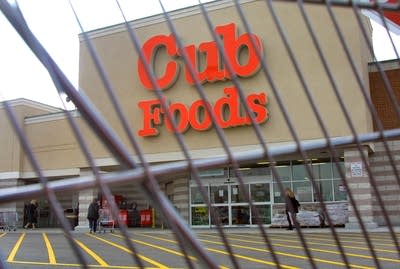Supervalu sells 5 grocery chains, retains Cub
Go Deeper.
Create an account or log in to save stories.
Like this?
Thanks for liking this story! We have added it to a list of your favorite stories.

Supervalu, the struggling Eden Prairie-based grocer, is selling five of its chains in a deal valued at $3.3 billion. The transaction will cut Supervalu's annual sales in half but relieve the company of much of its huge debt load.
The agreement announced today means Minnesota will keep one of its largest Fortune 500 companies and thousands of jobs. Investors welcomed news of the deal, sending Supervalu's share price up 14 percent.
The investor group on the other side of the deal is led by Cerberus Capital Management. Cerberus will take on nearly 900 stores and also offer to buy up to 30 percent of the remaining Supervalu for $4 per share. At a minimum Cerberus will wind up with a stake totaling one-fifth of current shares.
Supervalu will keep the Cub Foods chain in Minnesota and several other banners.
Turn Up Your Support
MPR News helps you turn down the noise and build shared understanding. Turn up your support for this public resource and keep trusted journalism accessible to all.
"They basically divest a large portion of poor performing assets, and they also unload about $3 billion in debt," Michael Keara, Morningstar retail analyst. "So, I think it's a good deal from Supervalu's perspective."
Keara warns that the grocer and its roughly 600 remaining stores in six separate chains still face tremendous challenges.
"I just think an operational turnaround for those supermarket banners is going to be extremely difficult," he said. "All face major competitive challenges. The small-format stores are going to be up against Walmart small-format stores, as they roll those out, as well as Dollar Stores. And you know they're very tough competitors."
"Supervalu is a story of complete total mismanagement and destruction of value. They took the third-largest supermarket operator in the United States and destroyed it."
Especially on price.
Supervalu has struggled for years to turn around its business and compete with low-price rivals.
Over four fiscal years, Supervalu's sales have fallen $9 billion to $36 billion. That tailspin helped force the company to put itself up for sale last summer.
"They've worked on that sale for a long time," said grocery industry consultant John Dean. "It's finally come to fruition."
Dean said the slimmed-down Supervalu, which will have about $17 billion in annual sales, can concentrate on its strengths now that it is getting rid of underperforming chains including Albertson's, Shaw's and Acme.
Following the sale, Supervalu will focus on its Save-A-Lot discount stores, as well as its regional chains such as Cub and Shop `n Save. It will also keep its wholesale business that distributes groceries to independent stores.
Supervalu's headquarters will remain in Eden Prairie, as will new CEO Sam Duncan, who will take leadership of the company when the sale closes. Most recently Duncan was CEO of OfficeMax. He will replace Wayne Sales, who was hired last summer to lead a Supervalu turnaround.
It may take several months to determine what impact the transaction may have on headquarters employment, a company spokesman said.
Overall, the company has some 8,700 employees and 44 company-owned stores in Minnesota. Union contracts will remain in place. A spokesman indicated Cub's efforts to lower prices will continue.
The sale gives Supervalu some time to try to turn itself around and recover from past mistakes, said retail consultant Howard Davidowtiz. But it's a toss-up as far as Supervalu surviving long-term, he said.
"It may be 50-50 that this company can ever be viable," he said. "I'm not sure. I think they have bought time. Supervalu is a story of complete total mismanagement and destruction of value. They took the third-largest supermarket operator in the United States and destroyed it."
Davidowitz has a hunch more deals may be coming even though Supervalu officials say they are done shopping the company.
Supervalu today reported a profit of $16 million for the quarter that ended Dec. 1. A year ago, the company lost $750 million. But sales fell about 5 percent, and the grocer's profit margin shrank, partly because the company cut prices.
Check the most recent price here.



